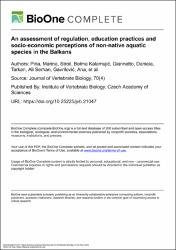An assessment of regulation, education practices and socio-economic perceptions of non-native aquatic species in the Balkans

View/
Date
2021Author
Piria, MarinaStroil, Belma Kalamujić
Giannetto, Daniela
Tarkan, Ali Serhan
Gavrilović, Ana
Aldemir, Ceray
Metadata
Show full item recordCitation
Piria, M., Stroil, B. K., Giannetto, D., Tarkan, A. S., Gavrilović, A., Špelić, I., ... & Zdraveski, K. (2021). An assessment of regulation, education practices and socio-economic perceptions of non-native aquatic species in the Balkans. Journal of Vertebrate Biology, 70(4), 21047-1.Abstract
Alongside climate change, the introduction of non-native species (NNS) is widely recognized as one of the main threats to aquatic biodiversity and human wellbeing. Non-native species and biodiversity are generally low priority issues on the political agendas of many countries, particularly in European countries outside the European Union (EU). The objectives and tasks of this study were to address the policy regulation, education level, education practices, and socioeconomic perceptions of NNS in the Balkans. A questionnairebased survey was conducted in Albania, Bosnia and Herzegovina, Montenegro, North Macedonia and Turkey (Balkan EU candidate and potential candidate members), in Croatia and Greece (Balkan EU Member States) and Italy (non-Balkan EU Member State). The EU Alien Regulation (1143/2014) concerning NNS is implemented in EU Member States and Montenegro, whereas Albania, Bosnia and Herzegovina and Turkey have not reported specific policy regulations for NNS. Permanent monitoring programmes specifically designed for NNS have not yet been established in the EU Member States. Most countries tackle the issue of NNS through educational activities as part of specific projects. Education level is indicative of the implementation of NNS policy regulation, and efforts are needed for the proper development of relative study programmes. Public awareness and educational preparedness concerning NNS in the Balkans were identified as poor. Strong programmes for management and education should be developed to increase public awareness to prevent further biodiversity losses in the Balkan region.

















